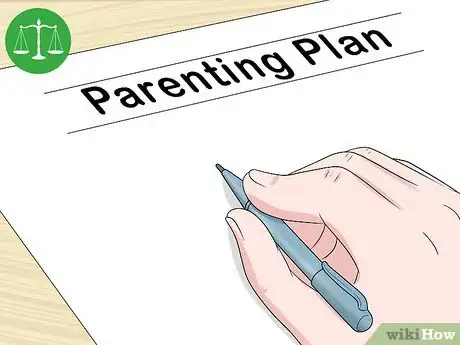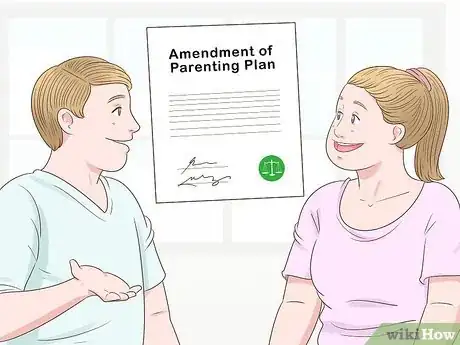This article was co-authored by Kathy Slattengren, M.Ed.. Kathy Slattengren is a Parent Educator and Coach and the Founder of Priceless Parenting. With over two decades of experience, Kathy specializes in helping parents build strong, loving relationships with their children. She has helped thousands of parents around the world through Priceless Parenting's online classes, presentations, coaching, and books. Kathy holds a Bachelor's degree in Computer Science and Psychology from The University of Minnesota and a Masters degree in Education and Instructional Design from The University of Washington. Kathy is a member of the National Parenting Education Network, the US Alliance to End the Hitting of Children, the International Society for Technology in Education, and a founding member of Parent Learning Link. Priceless Parenting has been featured on ABC News, Komo News, King 5 News, National PTA, Parent Map, and Inspire Me Today.
There are 8 references cited in this article, which can be found at the bottom of the page.
This article has been viewed 79,865 times.
A parenting plan is a document that two co-parents who do not live together use to help them work together to raise their child. The parenting plan may be mandated by family court, or it may be a more informal document. When writing a parenting plan, take time to consider how you want to approach all aspects of child rearing. No matter what agreement you come to, understand that you may have to amend it as your child ages.
Steps
Establishing Custody and Visitation
-
1Decide on the normal schedule. The first thing that you need to decide is who the child will live with and how often the other parent will visit the child. Depending on your individual circumstances, you may decide on joint custody, or you may decide that it is best for the child to live primarily with one parent.[1]
- If you have a baby, try to arrange the schedule so that both parents have the opportunity to participate in the day-to-day care of the baby, as this is important for bonding.
- If your child is older, the school schedule may influence your visitation schedule.
- In addition to establishing a regular schedule, talk about what will happen if one parent decides to move.
-
2Create a plan for holidays and vacations. You may want to make some special adjustments to your visitation schedule to accommodate for holidays and vacations. For example, if Father's Day falls on a day when the child would normally be with the mother, you may want to make a special exception for that day.[2]
- If you live close to each other, you may be able to split holidays with your child's other parent. For example, you may have the child for Christmas morning and your co-parent may have the child for Christmas evening.
- Be sure to consider vacation plans as well. For example, if you plan on taking a two-week vacation with your child over the summer, decide if your co-parent will be allowed to do the same. Be sure to coordinate vacations with your co-parent to avoid scheduling conflicts.
- You may also want to plan for birthday parties. Decide if you will have separate parties or if you will have one party to which both sides of the family will be invited.[3]
Advertisement -
3Think about special circumstances. In addition to holidays and vacations, there may be other things that pop up that will necessitate an adjustment to the visitation schedule. While it's impossible to plan for everything, having a basic idea of how you will handle special circumstances will help you avoid conflicts with your co-parent when they do come up.[4]
- Think about how you will adjust the schedule if the child is sick during a visitation time.
- Decide how you will deal with it if something unexpected disrupts the schedule, like a funeral or a last-minute invitation to a birthday party.
- If the child is not able to be with one parent during a normal visit day, decide if you will make this day up or just continue with the regular schedule. You may choose to have the child spend an extra day with that parent during the next visit, for example.
-
4Outline who the child is allowed to see or stay with. If there are certain members of the family who you do not trust to be around your child, it is important to outline these restrictions in the parenting plan. Talk through your concerns and decide if it is okay for the person to be around your child, as long as they are not alone.[5]
- You may also want to establish general guidelines for the type of person who is allowed to babysit your child. For example, you and your co-parent may agree that all babysitters must be at least 16 years old and must be certified in CPR.
-
5Determine how you will exchange your child. If your child spends time with both you and your co-parent, you will need to establish a procedure for exchanging the child. The right arrangement for you will depend on the kind of relationship you have with your co-parent and how close you live to each other.[6]
- If you and your co-parent have a good relationship, you could simply drop the child off at each other's houses.
- If you do not want your co-parent coming to your house, you could meet in a neutral location.
- You could also arrange your schedule so that one parent drops the child off at school and the other picks the child up from school.
Planning Everyday Routines and Activities
-
1Decide how you will choose activities. Extracurricular activities often involve a big time commitment, so it's important to talk to your co-parent about what activities your child will participate in. Figure out if you will discuss each activity before committing to it or if one parent will be permitted to sign the child up for an activity without the approval of the other.[7]
- In addition to time considerations, you should also consider that your co-parent may not agree with the activity or may think it is too expensive. Having a plan for dealing with these kinds of situations ahead of time will make the decisions much easier.
- Make sure to think about transportation to and from activities, especially if they are far away. It's important to agree on this before committing your child to any activities that may take place during your co-parent's visitation time.
-
2Agree on who will attend events. Whether your child plays soccer or performs in the school play, you will eventually be faced with an event that you may both want to attend. Come up with an agreement regarding who will attend which events with your child.[8]
- You may decide to attend alternating events, especially if they are frequent.
- If you agree to both attend, decide if there will be any rules. Will you interact with each other or will you sit separately and not speak to each other?
-
3Determine how you will communicate with your co-parent. Lots of things will come up while your child is with you that your co-parent will want to know about, and vice-versa. This includes things like the schedule for soccer games, punishments you have established, or issues that your child has been having at school. It's important to have a plan for how and when you will communicate this type of information. [9]
- Decide on your preferred method of communication. If you don't like talking to your co-parent in person or on the phone, you may decide to communicate by email.
- If you decide to use an intermediate to communicate, outline how, and how often, this communication will occur.
- Also decide what information needs to be shared. You co-parent may want to know about it every time your child has a cold, or the two of you may decide that this is not necessary.
-
4Coordinate routines. Walk through your child's everyday routine with the other parent and try to agree on a schedule that you both can follow. Consistency is very important for young children, so having the same routine in both households will make things much easier.[10]
- For babies, it's important that sleeping and feeding schedules remain consistent.
- For older children, it's important that homework and playtime routines remain consistent.
-
5Establish rules for communication with the child. It's important to lay out clear rules for how and when each parent will communicate with the child during the other parent's visit time. Try to come to an agreement that allows the child to stay in contact with both parents regularly, but which will not cause conflicts between the parents.[11]
- You may choose to establish rules regarding the hours during which the other parent can call the child. You may also want to both agree to allow the child privacy when talking to the other parent.
- Your rules may change depending on your schedule. For example, if the child is staying with one parent for the entire summer, the other parent may want to phone frequently. If the child is only with the other parent for a few hours, frequent phone calls may not be appropriate.
- In addition, you and your co-parent must decide how much information about the parenting plan you will share with your child. The right choice for you will depend on your child's age and maturity level. For example, if you have a teenage son who you think would appreciate the opportunity to contribute to the plan, you may want to allow him to help you make some of your decisions. You may decide that certain aspects of the parenting plan, like the financial clauses, are not appropriate to share.
Agreeing on Financial Responsibilities
-
1Establish a child support agreement. Child support is probably the most hotly contested aspect of a parenting plan. Most often, the non-custodial parent pays a fixed amount of money to the other parent each month to help cover the child's expenses. The amount will depend on each parent's income and the custody arrangement. If possible, try to agree on a child support arrangement that works for both you and your co-parent.[12]
- If you are not able to come to an agreement about child support, you can go to family court and have a judge mandate child support.
- Keep in mind that child support may need to change if other elements of the parenting plan change. You may have to go to court to get these changes made.
-
2Discuss financial support for adult children. In most cases, child support is only mandated for minors. However, you and your co-parent may decide that it is appropriate to financially support your child for longer. If this is the case, you will need to incorporate the details of your financial support into your parenting plan.[13]
- You may want to establish an age at which you will no longer financially support your child, or you may want to use some other factor to determine financial support. For example, you and your co-parent may decide that your financial support will end when your child graduates from college.
-
3Determine how everyday expenses will be handled. If it is not already outlined in your child support agreement, discuss with your co-parent who will be responsible for everyday expenses. For example, if your child is going to a birthday party and needs to buy a gift, who will pay for it?
- You may also want to come up with guidelines for how much it is appropriate to spend on certain items.
-
4Decide how you will handle large expenses. In addition to everyday expenses, you and your co-parent will need a plan for larger expenses associated with your child. This may include things like medical bills or the fees associated with a school trip abroad.[14]
- You may want to make a provision that would require that large (non-emergency) expenses be agreed upon before they are incurred. This would prevent your co-parent from making a costly purchase for your child that you do not agree with and then expecting you to pay for half of it.
-
5Figure out if belongings will be shared. Decide with your co-parent whether you will keep individual items for your child at each of your homes or if you will allow your child to bring items back and forth. This may be applicable to anything from a video game system to basic items like clothing and shoes.[15]
Making Important Decisions
-
1Discuss lifestyle choices. If there are certain lifestyle choices that you have made for your child, it is important to discuss these with your co-parent and come to an agreement that you are both happy with. For example, you may want to ensure that your child eats a healthy diet while staying with your co-parent.[16]
- You may also make certain provisions regarding the co-parent's lifestyle choices. For example, you may request that your co-parent not smoke around your child.[17]
-
2Agree on rules, responsibilities, and discipline. It's very important that you and your co-parent be consistent with your expectations and disciplinary methods. Have a detailed conversation about what you expect of your child and how you will deal with it if your child fails to meet those expectations.[18] [19]
- If your child has a curfew, be sure that it is the same at both households. Also discuss under what circumstances your child is allowed to go out without parental supervision (if any).
- Discuss other rules as well, including those regarding phone, internet, and television usage.
- Decide what the consequences will be if your child violates the rules of the household, and implement them consistently.
- If your child has chores, talk to your co-parent about implementing the same or similar chores in the other household.
-
3Develop a plan for approaching religion and cultural heritage. If you and the other parent have different religions and heritages, decide if you want to teach your child both. Make a decision that you can both agree on.[20]
- If you have different religions, you may decide to educate the child about both.
- If one parent practices their religion more than the other, you may decide to teach your child only about that one religion.
-
4Create a plan for schooling and education. Whether you agree to public schooling, private schooling, or homeschooling, determine which type of schooling you want for your child. If you have not chosen a school yet, you may want to discuss with your co-parent how you will go about making this decision when the time comes.
- Note also how you will be dealing with parent teacher conferences. You can take turns attending, or both parents can attend together. Another option would be to make arrangements with the teacher to attend all the conferences separately.
- Make a note in your parenting strategy regarding receiving information and school grades from the school. Again, you can arrange for one person to receive everything and make copies for the other, or you can ask the school to send you both the same information.
- Decide who will be attending school events. You can choose to take turns or have one person attend all the events. Make a decision that you are both happy with.
- Also consider how you will pay for your child's college education when the time comes. You may want to establish guidelines regarding how much each parent is willing to contribute.[21]
-
5Determine who will attend to the child's medical needs. Decide who will cover the cost of medical and dental insurance or if you will split the costs. Talk with your co-parent about your child's medical care, including how you will select doctors, who will attend appointments, and what the protocol should be in the case of emergencies.[22]
- If both you and the other parent work, you may decide to take turns taking your child to medical appointments. The other option is to establish responsibility depending on who has custody of the child at the time.
- These decisions are especially important if your child has special medical needs. It's very important that both parents be on the same page when it comes to care and treatment.
- You should also determine how to choose elective procedures (like braces) and how they will be paid for.
-
6Create a plan for handling future decisions. It is inevitable that other things will come up that are not included in your parenting plan. For this reason, it's a good idea to have a general understanding of how you and your co-parent will go about making future decisions. For example, you might agree that you will not make any major decisions without consulting the other parent, and that you will discuss the issues in person.
Putting Your Parenting Plan in Writing
-
1Decide if you need to go to court. In some cases, co-parents are perfectly capable of agreeing on a parenting plan without any help. However, this does not work for everyone. If you can't come to an agreement with your co-parent about one or more issues, you may need to go to family court to resolve the issue. The judge will make a decision and issue an order that will enforce the parenting plan.[23]
- In some jurisdictions, you may be required to file a parenting plan with the courts if you plan on sharing custody of a minor child. Check with your local family court to find out if this applies to you.[24]
-
2Write everything down. Writing a parenting plan is no small task. It will require a significant time commitment from both you and your co-partner. Try to coordinate a time when the two of you can sit down and discuss all aspects of child rearing. Write everything down, including the smallest details. This will help prevent confusion later on.
- Make sure each of you has a copy of the parenting plan.
-
3Sign the plan. Signing the parenting plan demonstrates that you are both committing to adhering to the agreement that you came up with. Even if you are not filing the document with the courts, it's still a good idea to have both parties sign it.
- If you are required to file your parenting plan with the courts, you will need to both sign the document in front of a notary public.[25]
-
4Be willing to amend your plan. As children age, plans will need to adapt to their needs. When developing a parenting plan, it's important to keep in mind that just because a certain arrangement works now, does not mean it will work forever. Be flexible and willing to talk about changing the plan whenever it seems necessary.
- You may want to create a schedule for reviewing and revising the plan with your child's other parent, but it's still a good idea to be open to discussing it whenever the need arises.
Expert Q&A
-
QuestionHow can I create include extended family involvement in a parenting plan?
 Catherine Palomino, MSCatherine Palomino is a former Childcare Center Director in New York. She received her MS in Elementary Education from CUNY Brooklyn College in 2010.
Catherine Palomino, MSCatherine Palomino is a former Childcare Center Director in New York. She received her MS in Elementary Education from CUNY Brooklyn College in 2010.
Master's Degree, Elementary Education, CUNY Brooklyn College I understand that you want to involve your extended family with your parenting plan. Speak to your co-parent about the provisions you wish to include and make the necessary revisions to the plan concerning extended family. After an agreement has been made between you and your child’s co-parent, amend the plan to include the new information. If you and your co-parent cannot come to an agreement on extended family involvement with the parenting plan, then you might need support from a professional family mediator or a judge. Both you and your child’s co-parent need to be in agreement with extended family involvement with the parenting plan, and what provisions to take if other parties do not adhere to the plan.
I understand that you want to involve your extended family with your parenting plan. Speak to your co-parent about the provisions you wish to include and make the necessary revisions to the plan concerning extended family. After an agreement has been made between you and your child’s co-parent, amend the plan to include the new information. If you and your co-parent cannot come to an agreement on extended family involvement with the parenting plan, then you might need support from a professional family mediator or a judge. Both you and your child’s co-parent need to be in agreement with extended family involvement with the parenting plan, and what provisions to take if other parties do not adhere to the plan. -
QuestionDo I need the other parent's physical address to file a parenting plan with the courts? My son's biological dad has been hiding, and though I can generally get him to email me, he won't give me his address.
 Catherine Palomino, MSCatherine Palomino is a former Childcare Center Director in New York. She received her MS in Elementary Education from CUNY Brooklyn College in 2010.
Catherine Palomino, MSCatherine Palomino is a former Childcare Center Director in New York. She received her MS in Elementary Education from CUNY Brooklyn College in 2010.
Master's Degree, Elementary Education, CUNY Brooklyn College This is a question for your local family court. Differing locales will have different regulations regarding filing parenting plans in the absence of a co-parent’s address. Speak with your family court lawyer or a social worker to get information specific to your district.
This is a question for your local family court. Differing locales will have different regulations regarding filing parenting plans in the absence of a co-parent’s address. Speak with your family court lawyer or a social worker to get information specific to your district. -
QuestionDo I need a lawyer or justice of peace to sign a parenting plan?
 Community AnswerYou don't "need" one, but you can get one. The document can be as formal or informal as you like.
Community AnswerYou don't "need" one, but you can get one. The document can be as formal or informal as you like.
References
- ↑ http://justice.gc.ca/eng/fl-df/parent/ppc-lvppp/index.html
- ↑ http://justice.gc.ca/eng/fl-df/parent/ppc-lvppp/index.html
- ↑ http://www.childreninthemiddle.com/coparentingplans.htm
- ↑ http://justice.gc.ca/eng/fl-df/parent/ppc-lvppp/index.html
- ↑ http://www.childreninthemiddle.com/coparentingplans.htm
- ↑ http://www.divorcesource.com/ds/california/100-things-you-must-know-before-creating-a-parenting-plan-otherwise-known-as-a-custody-and-visitation-order--4339.shtml
- ↑ http://www.childreninthemiddle.com/coparentingplans.htm
- ↑ http://www.divorcesource.com/ds/california/100-things-you-must-know-before-creating-a-parenting-plan-otherwise-known-as-a-custody-and-visitation-order--4339.shtml
- ↑ http://www.divorcesource.com/ds/california/100-things-you-must-know-before-creating-a-parenting-plan-otherwise-known-as-a-custody-and-visitation-order--4339.shtml
- ↑ http://www.mostenmediation.com/books/articles/LASC_parenting00-3.pdf
- ↑ http://www.divorcesource.com/ds/california/100-things-you-must-know-before-creating-a-parenting-plan-otherwise-known-as-a-custody-and-visitation-order--4339.shtml
- ↑ http://www.divorcesource.com/ds/california/100-things-you-must-know-before-creating-a-parenting-plan-otherwise-known-as-a-custody-and-visitation-order--4339.shtml
- ↑ http://www.divorcesource.com/ds/california/100-things-you-must-know-before-creating-a-parenting-plan-otherwise-known-as-a-custody-and-visitation-order--4339.shtml
- ↑ http://www.divorcesource.com/ds/california/100-things-you-must-know-before-creating-a-parenting-plan-otherwise-known-as-a-custody-and-visitation-order--4339.shtml
- ↑ http://www.divorcesource.com/ds/california/100-things-you-must-know-before-creating-a-parenting-plan-otherwise-known-as-a-custody-and-visitation-order--4339.shtml
- ↑ http://www.courts.ca.gov/15872.htm
- ↑ http://www.mncourts.gov/documents/Parenting-Agreement-Worksheet.pdf
- ↑ Kathy Slattengren, M.Ed.. Parent Educator & Coach. Expert Interview. 23 June 2021.
- ↑ http://www.mncourts.gov/documents/Parenting-Agreement-Worksheet.pdf
- ↑ http://www.childreninthemiddle.com/coparentingplans.htm
- ↑ http://www.divorcesource.com/ds/california/100-things-you-must-know-before-creating-a-parenting-plan-otherwise-known-as-a-custody-and-visitation-order--4339.shtml
- ↑ http://www.childreninthemiddle.com/coparentingplans.htm
- ↑ http://www.divorcesource.com/ds/california/100-things-you-must-know-before-creating-a-parenting-plan-otherwise-known-as-a-custody-and-visitation-order--4339.shtml
- ↑ http://www.flcourts.org/core/fileparse.php/293/urlt/995a.pdf
- ↑ http://www.flcourts.org/core/fileparse.php/293/urlt/995a.pdf



















































































